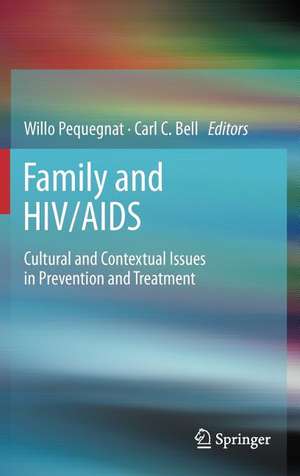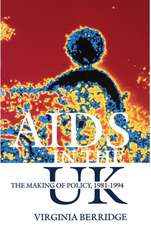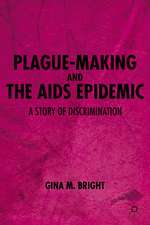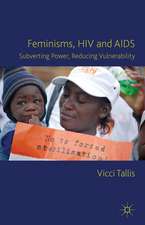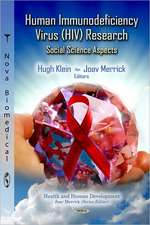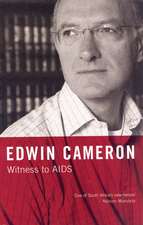Family and HIV/AIDS: Cultural and Contextual Issues in Prevention and Treatment
Editat de Willo Pequegnat, Carl Bellen Limba Engleză Hardback – 21 oct 2011
| Toate formatele și edițiile | Preț | Express |
|---|---|---|
| Paperback (1) | 373.33 lei 6-8 săpt. | |
| Springer – 23 oct 2014 | 373.33 lei 6-8 săpt. | |
| Hardback (1) | 380.45 lei 6-8 săpt. | |
| Springer – 21 oct 2011 | 380.45 lei 6-8 săpt. |
Preț: 380.45 lei
Preț vechi: 400.47 lei
-5% Nou
Puncte Express: 571
Preț estimativ în valută:
72.80€ • 76.36$ • 60.60£
72.80€ • 76.36$ • 60.60£
Carte tipărită la comandă
Livrare economică 01-15 aprilie
Preluare comenzi: 021 569.72.76
Specificații
ISBN-13: 9781461404385
ISBN-10: 146140438X
Pagini: 380
Ilustrații: XIV, 364 p.
Dimensiuni: 155 x 235 x 24 mm
Greutate: 0.71 kg
Ediția:2012
Editura: Springer
Colecția Springer
Locul publicării:New York, NY, United States
ISBN-10: 146140438X
Pagini: 380
Ilustrații: XIV, 364 p.
Dimensiuni: 155 x 235 x 24 mm
Greutate: 0.71 kg
Ediția:2012
Editura: Springer
Colecția Springer
Locul publicării:New York, NY, United States
Public țintă
Professional/practitionerCuprins
Foreword.- Part I: Overview of Family and HIV and Mental Health.- Families and HIV/AIDS: First Line of Health Promotion and Disease Prevention.- Family as the Model for Prevention of Mental and Physical Health Problems.- The Role of Settings in Family Based-Prevention of HIV/STDs.– Part II: Role of Families in Prevention and Care.- Parents as AIDS educators.- Mothers: The Major Force in Preventing HIV/STD Risk Behaviors.- Fathers and HIV: A Missing Factor in Developing Interventions but Not in the Lives of Their Children.– Communities and HIV.– Couples-based HIV Prevention and Treatment:State of Science, Gaps and Future Directions.– The Role of Families Among Orphans and Vulnerable Children In Confronting HIV/AIDS in Sub-Saharan Africa.– Collaborating with Families and Communities to Prevent Youth HIV Risk Taking and Exposure.- Families and HIV Medical Adherence.- Part III. Ethnic, Cultural, and Gender Issues in Families.- Family-Based HIV Prevention with African American and Hispanic Youth .– Parents as Agents of HIV Prevention for Gay,Lesbian, and Bisexual Youth.- Family-Based HIV Prevention for Adolescents with Psychiatric Disorders.- Part IV. Implementing Family Systems Evidence-Based Prevention.- Adaptation of Interventions for Families Affected by HIV.- Promoting Family-Focused Evidenced-Based Practice in Frontline HIV/AIDS Care.- Part V. Challenges for the Future.- Future Directions for Family-Based Prevention and Treatment Research: Challenges and Emerging Issues.
Recenzii
From the reviews:
“The ultimate purpose is to encourage researchers and providers to understand the utility of applying family-oriented approaches to prevent the spread of HIV/AIDS. … A wide variety of professionals engaged in HIV/AIDS care, medical doctors, social workers, researchers, and outreach workers among others, would find this book helpful in planning effective interventions and further promoting relevant research agendas with family systems in mind. … For interdisciplinary teams involved with families and HIV/AIDS care, this book serves as a valuable addition to culturally informed discourse.” (Lisa D. Zerden, Doody’s Review Service, April, 2012)
“The ultimate purpose is to encourage researchers and providers to understand the utility of applying family-oriented approaches to prevent the spread of HIV/AIDS. … A wide variety of professionals engaged in HIV/AIDS care, medical doctors, social workers, researchers, and outreach workers among others, would find this book helpful in planning effective interventions and further promoting relevant research agendas with family systems in mind. … For interdisciplinary teams involved with families and HIV/AIDS care, this book serves as a valuable addition to culturally informed discourse.” (Lisa D. Zerden, Doody’s Review Service, April, 2012)
Notă biografică
CarlC. Bell, M.D., is Clinical Professor of Psychiatry and Public Health and Director of the Institute for Juvenile Research (IJR),University of Illinois at Chicago (UIC). IJR is century old, multi-million dollar academic institute providing child and family research, training, and service, employing 257 academic faculty and support staff. Dr. Bell is President and C.E.O. - Community Mental Health Council (CMHC) and Foundation, Inc. in Chicago. CMHC a large multi-million comprehensive community mental health center employing 390 social service geniuses. During 40 years, he has published more than 450 articles, chapters,and books on mental health and authored The Sanity of Survival. He has been interviewed by Ebony; Jet; Essence; Emerge;New York Times; Chicago Tribune Magazine; People Magazine; Chicago Reporter; "Nightline";ABC News; NPR; "CBS Sunday Morning"; The News Hour with Jim Lehrer; the Tom Joyner Morning Show; Chicago Tonight; and the "Today" show. A1967 graduate of UIC, he earned his M.D. from Meharry College in Nashville,Tennessee in 1971. He completed his psychiatric residency in 1974 at the Illinois State Psychiatric Institute/Institute for Juvenile Research in Chicago.
Willo Pequegnat, Ph.D., is Associate Director of the International AIDS Prevention Research in the NIMH Division of AIDS Research at the National Institutes of Health (NIH). Dr. Pequegnat has a range of experience with both national and international HIV/STD prevention research and has expertise in primary and secondary behavioral preventive interventions,stress and coping, psychological, neuropsychological, and physical functioning,and quality of life. Her research involves multilevel social organization and complex relationships: couples, families, communities, societal (media,policy), technological (internet, web, smart phones, etc.). She is working on the issue of social instability, such as consequences of war,terrorism,migration, female and drug trafficking on HIV/STD transmission. She took the initiative to develop a research program on the role of families in preventing and adapting to HIV/AIDS and chairs the only annual international research conference on families and HIV/AIDS. She co-edited the book on this program of research entitled, Working with Families in the Era of AIDS. Dr. Pequegnat initiated and is co-editor of How to Write a Successful Research Grant Application: A Guide for Social and Behavioral Scientists,2ndedition, Community Interventions and AIDS, and From Child Sexual Abuse to Adult Sexual Risk: Trauma, Revictimization, and Intervention. She has developed three special issues of AIDS and one of JAIDS. She plans and implements national and international workshops, conferences, and symposia on HIV/STD, and represents NIMH on science policy-making committees and work groups in the Public Health System on a broad range of HIV/STD issues.
Willo Pequegnat, Ph.D., is Associate Director of the International AIDS Prevention Research in the NIMH Division of AIDS Research at the National Institutes of Health (NIH). Dr. Pequegnat has a range of experience with both national and international HIV/STD prevention research and has expertise in primary and secondary behavioral preventive interventions,stress and coping, psychological, neuropsychological, and physical functioning,and quality of life. Her research involves multilevel social organization and complex relationships: couples, families, communities, societal (media,policy), technological (internet, web, smart phones, etc.). She is working on the issue of social instability, such as consequences of war,terrorism,migration, female and drug trafficking on HIV/STD transmission. She took the initiative to develop a research program on the role of families in preventing and adapting to HIV/AIDS and chairs the only annual international research conference on families and HIV/AIDS. She co-edited the book on this program of research entitled, Working with Families in the Era of AIDS. Dr. Pequegnat initiated and is co-editor of How to Write a Successful Research Grant Application: A Guide for Social and Behavioral Scientists,2ndedition, Community Interventions and AIDS, and From Child Sexual Abuse to Adult Sexual Risk: Trauma, Revictimization, and Intervention. She has developed three special issues of AIDS and one of JAIDS. She plans and implements national and international workshops, conferences, and symposia on HIV/STD, and represents NIMH on science policy-making committees and work groups in the Public Health System on a broad range of HIV/STD issues.
Textul de pe ultima copertă
Three decades into the HIV pandemic, the goals remain clear: reduce the number of infections,improve the health outcomes of those who are infected, and eliminate disparities in care. And one observation continues to gain credence: families are a powerful resource in preventing, adapting to, and coping with HIV.
Recognizing their complex role as educators, mentors, and caregivers, Family and HIV/AIDS assembles a wealth of findings from successful prevention and intervention strategies and provides models for translating evidence into effective real-world practice.
Chapters spotlight the differing roles of mothers and fathers in prevention efforts, clarify the need for family/community collaborations, and examine core issues of culture,ethnicity, gender, and diagnosis (e.g., minority families, adolescents with psychological disorders). Throughout, risk reduction and health promotion are shown as a viable public health strategy.
Among the topics covered:
From Jose Szapocznik, Ph.D., Executive Dean for Research and Research Training Chair,Department of Epidemiology and Public Health,Miller School of Medicine,University of Miami The editors and authors are to be commended for bringing together an impressive amount of findings on the role of families in preventing and addressing HIV infection. The book documents the tremendous progress in this program of research since the publication of Working with Families in the Era of AIDS IN 2000. While the book is focused on ethnic minority families and HIV, the strategies have application for all families coping with a range of chronic diseases and should be tremendously useful for research, public health care providers, and policy makers.
Recognizing their complex role as educators, mentors, and caregivers, Family and HIV/AIDS assembles a wealth of findings from successful prevention and intervention strategies and provides models for translating evidence into effective real-world practice.
Chapters spotlight the differing roles of mothers and fathers in prevention efforts, clarify the need for family/community collaborations, and examine core issues of culture,ethnicity, gender, and diagnosis (e.g., minority families, adolescents with psychological disorders). Throughout, risk reduction and health promotion are shown as a viable public health strategy.
Among the topics covered:
- The family as the model for HIV prevention.
- The role of settings in family-based prevention of HIV/STDs.
- Couples-based HIV prevention and treatment.
- Parents as agents of HIV prevention for gay, lesbian, and bisexual youth.
- Promoting family-focused evidence-based practice in HIV/AIDS care.
- Families and HIV medical adherence.
From Jose Szapocznik, Ph.D., Executive Dean for Research and Research Training Chair,Department of Epidemiology and Public Health,Miller School of Medicine,University of Miami The editors and authors are to be commended for bringing together an impressive amount of findings on the role of families in preventing and addressing HIV infection. The book documents the tremendous progress in this program of research since the publication of Working with Families in the Era of AIDS IN 2000. While the book is focused on ethnic minority families and HIV, the strategies have application for all families coping with a range of chronic diseases and should be tremendously useful for research, public health care providers, and policy makers.
Caracteristici
Addresses the contribution of different families members to prevention and treatment of its members Uses a definition of families that recognizes the reality of today’s families, the latest research findings gathered into one volume that have implications for preventing and treating HIV/AIDS and other major diseases Outlines the challenges for the next decade and suggests some creative solutions Includes supplementary material: sn.pub/extras
